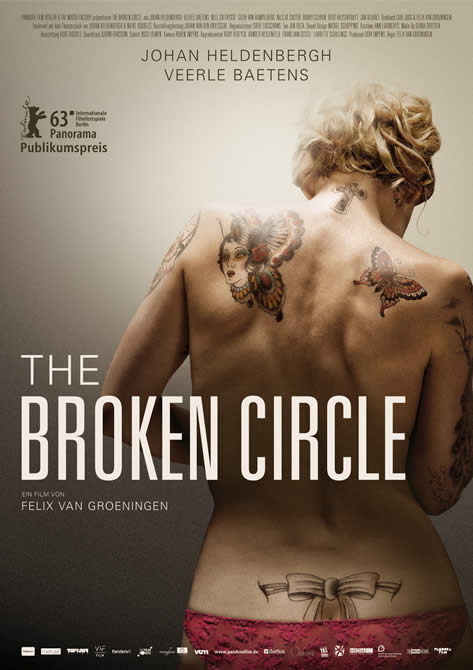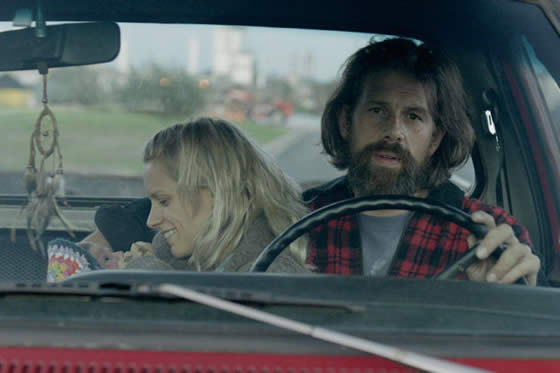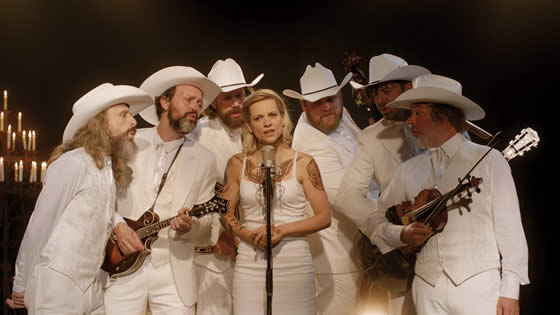THE BROKEN CIRCLE BREAKDOWN, Belgium’s Official Entry for the Academy Award for Best Foreign Language Film, is a portrait of the great love affair between tattoo artist Elise (Veerle Baetens, The White Queen) and bluegrass musician Didier (Johan Heldenbergh). After bonding over their shared enthusiasm for American music and culture, they dive headfirst into a sweeping romance that plays out on and off stage — but when an unexpected tragedy hits their new family, everything they know and love is tested.
Lead actor Johan Heldenbergh co-wrote the hit play that THE BROKEN CIRCLE BREAKDOWN is based on. It was adapted for the screen by director Felix Van Groeningen with Carl Joos (The Memory of a Killer). Bjorn Eriksson composed the bluegrass songs, created the score, and guided the performances of the two actors who do their own singing in the film. The soundtrack was number one in the soundtrack charts in the territories where it has been released and has become the best-selling soundtrack of all time in Belgium. Co-stars Baetens and Heldenbergh are part of the off-screen Broken Circle Breakdown Bluegrass Band, whose European tour is sold out all through 2014.
Van Groeningen graduated from Ghent’s KASK (Royal Academy of Fine Arts). His previous film, The Misfortunates, was a selection of the Cannes Film Festival’s Director Fortnight where it won the CICAE prize. THE BROKEN CIRCLE BREAKDOWN, an audience favorite at film festivals around the world and in its home country where it was a smash box office hit, is his fourth feature.
Bijan Tehrani: Please tell us what actually inspired to make this beautiful film?
Felix Van Groeningen: The movie is based on a theatre play and that is the big inspiration of course. I had seen it and was completely blown away by it, although it was not an immediate choice to make a film out of it. I thought about and then I went back and forth and decided that I should do it, but I did not know how and I rejected it. At some point, I just re-read the text and thought that this was so beautiful and I just had to do it. I really sat on some kind of emotional rollercoaster during the scenes of the play and that experience was profound—I wanted to recreate it cinematically.
BT: I think it is a perfect cinematic recreation! With some adaptations, you can see clear parallels to the stage type of concept, but this is a pure film; the language of film is used perfectly here. The film has so many different layers of story and I was amazed at how well they were all molded together along with the music as well. How did you manage to mold all of these themes and ideas together in this film?
FVG: By not giving up, I guess! When I would often curse myself and tell myself that this was never going to work and that it was too much, I’m glad I didn’t quit because the film needed all of that. Its roots were all in the theatre so I needed all that effort and I didn’t want to strip it down, so I guess the hard part was to find a way to have all of the elements in there without needing to explain everything. So we had to add all of those little different story lines and all of these things between the couple that were explained in the theatre play, but we had to show them in the movie with less context. We accomplished this by just by giving it time and adding layer-after-layer-after-layer on top of it, and taking the time during editing to let the film flow and let it speak through the images by cutting out dialogue. Taking the liberty during editing to cut-out dialogue to have those layers speak for themselves, I think that’s how we did it.
BT: One of the difficult parts that you have to deal with when adapting the stage play is the issue of the sick child, which is so sensitive to deal with. How was it for you? Did you have any personal experience with knowing or living with a sick child?
FVG: No, this aspect of the film was strengthened by research. I visited some hospitals and watched a lot on the internet of course, so there is no real life experience for me. I don’t have any children yet—I want to some day, but I don’t have yet—so yeah we just did research on that.
 BT: The emotion of the relationship between the couple and the child also and how it plays over time is very, very interesting. You were involved as a co-writer of the screenplay; how was the experience of writing this film?
BT: The emotion of the relationship between the couple and the child also and how it plays over time is very, very interesting. You were involved as a co-writer of the screenplay; how was the experience of writing this film?
FVG: What I said before about creating the structure by adding one layer after another, most of that was started up early-on during writing process. It was hard because we had seen this beautiful play and wanted to re-create it, but we had to find its own logic through the film and there is no manual to do that, so you just have to try a lot of things, develop a lot of bad ideas, throw them away and then at one point hit the right idea, so that was a little frustrating. On the other hand, there is an original which you can fall back on, and which keeps you going forward and keeps you trying because you think it is so beautiful. We saw that the play contained a lot of monologues, many of which are amazing. The last one, I just loved it and it found its way into the film, but I think in about 10 different scenes or so, there is one monologue from the theatre play and then in the end, it becomes three or four story lines throughout the whole movie. Developing that was really fun because I thought the original was so beautiful.
BT: Music has been masterfully used in the film. The music was beautiful, but also it plays a lot into the story. Had you had any experience with music and how did you go about incorporating music into the film?
FVG: What we discovered is that you cannot stop your storytelling to show a song, and that was the same way that a theater play would work. What we did was try and find different ways to help along the narrative, so we used the music—or rather the songs—for big parts of the storytelling or really, really emotional moments, where the music would have a different function. In these cases, the music actually stops the storytelling or just pauses the storytelling for just the moment of the song, but as the music is so emotional you would not get out of the moment and that creates this incredible tension, so that is the other way that we used the music. Of course in the end, there is the editing which adds another layer, where you use the music just as the so-called binding to blend everything together.
BT: How did you go about casting the film?
FVG: While I was writing I felt that I wanted to do auditions for the female lead because I didn’t have a clear idea of who I would want to play the part. I had seen Veerle before and I never worked with her, so I knew that I wanted to see her on an audition, and then when I saw Johan and Veerle together, it was very quickly clear to me that she had to play it. She added something that I never had though of before, she added a kind of danger to this character and it wasn’t in the writing until then. I realized that this is what this  character needs and it is going to make it better; it is going to make the relationship with Johan stronger, more intense, more believable and real, and so that is why I jumped to her and fell for her. The audition for the little girl, we saw a lot of kids. That’s the trade-off when you work with kids that are so small, you have to just see a lot of them and give them the time to grow and that’s what really happened. She was only five years old at the time of the audition and the shooting, and every time she came back we saw her getting better and doing the scenes that she was supposed to do and just getting better and better, and really having fun with it. It is really important that when you are working with a little kid that they like to do what they are being told to do, and she had a great summer.
character needs and it is going to make it better; it is going to make the relationship with Johan stronger, more intense, more believable and real, and so that is why I jumped to her and fell for her. The audition for the little girl, we saw a lot of kids. That’s the trade-off when you work with kids that are so small, you have to just see a lot of them and give them the time to grow and that’s what really happened. She was only five years old at the time of the audition and the shooting, and every time she came back we saw her getting better and doing the scenes that she was supposed to do and just getting better and better, and really having fun with it. It is really important that when you are working with a little kid that they like to do what they are being told to do, and she had a great summer.
BT: Belgian Cinema has produced a lot of filmmakers who have been able to produce great work while still maintaining their originality, but also portraying a very American-inspired style of film.
FVG: I have no idea, to be honest, because I don’t live here. I do know that I have seen the film work throughout the world, all over the world. It has been at festivals in Belgium and France, and people just respond very emotionally to it. It touches something very personal, very deep with people, and this is what makes the film work. People talk about it and have other people go and see it, so this experience has been great.
BT: The death scene in the hospital and the song that is played there, I believe this scene will become a classic on its own.
FVG: Thank you! I would hope that it might be, since there are some issues that are more sensitive in the US. I thought there would be more issues up-front and I realized that this is not the case. We had a screening yesterday and it was amazing how people responded and how that wasn’t at all an issue or something.
BT: What do you think your chances are for receiving an Oscar nomination, or even the Best Foreign Language Film Award? How much could that effect and help the film?
FVG: Well, no one knows anything about the Oscars and I could not put a percentage on it, but I do know that the buzz is present and we feel it. We will really do our best to help that by just showing the movie as much as possible and talking about it, doing interviews and spending some time in the U.S. to promote it; that is all we can do and it is out of our hands, I guess. We saw with Bullhead that a nomination can really help. The Oscars are the Olympics of the film industry, so once you are there you are pretty well known and your name is on the map all over the place, so it is incredible what it does.
